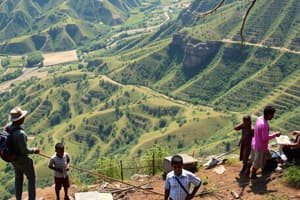Podcast
Questions and Answers
What do cultural anthropologists aim to understand?
What do cultural anthropologists aim to understand?
- Historical changes in traditional farming practices
- The impact of globalization on rural communities
- Why certain customs persist despite changing circumstances (correct)
- Challenges faced by agricultural workers
How do demographics intersect with geography?
How do demographics intersect with geography?
- Through the analysis of traditional farming practices
- In understanding population growth patterns (correct)
- By focusing on climate change mitigation strategies
- Through studying migration patterns of certain bird species
Which of the following falls under environmental issues and sustainability?
Which of the following falls under environmental issues and sustainability?
- Conservation efforts and pollution control measures (correct)
- Traditional farming practices in rural communities
- Technological advancements in agriculture
- Historical analysis of migration patterns
Why is understanding sustainable practices important for future policies?
Why is understanding sustainable practices important for future policies?
In geography, what does the term 'demographics' refer to?
In geography, what does the term 'demographics' refer to?
How does geography relate to humanity's relationship with place and space?
How does geography relate to humanity's relationship with place and space?
What is the main focus of geographers when analyzing human interaction with the environment?
What is the main focus of geographers when analyzing human interaction with the environment?
How do geographers use regionalization to understand different parts of a country?
How do geographers use regionalization to understand different parts of a country?
Which process helps geographers visualize relationships between cultural elements and physical features of a landscape?
Which process helps geographers visualize relationships between cultural elements and physical features of a landscape?
What kind of activities might lead to urban sprawl according to the text?
What kind of activities might lead to urban sprawl according to the text?
In geography within the context of social sciences, what are some factors geographers consider when studying human interaction with the environment?
In geography within the context of social sciences, what are some factors geographers consider when studying human interaction with the environment?
How does landscape analysis differ from regionalization in geography?
How does landscape analysis differ from regionalization in geography?
Flashcards are hidden until you start studying
Study Notes
Social Science: Exploring Geographical Concepts
Social science is a broad discipline concerned with understanding human behavior and social interactions within societies. A significant aspect of this field involves studying spatial patterns and relationships between people, places, and environments. This branch of social science often falls under the umbrella term 'geography'. In this section, we will explore some key concepts related to geography within the context of social sciences.
Human Interaction With Environment
Geographers examine how humans interact with their environment by considering factors such as population distribution, land use changes, urbanization, and natural disasters. They also analyze the impact of these activities on ecosystems and landscapes. For instance, they might study the movement of large populations into cities, leading to urban sprawl and its consequences for both ecological systems and infrastructure development.
Regionalisation And Landscape Analysis
Regionalization refers to the process of dividing larger regions into smaller areas based on specific criteria. These divisions can help us better understand economic activity, resource allocation, and other aspects affecting different parts of a country or continent. Landscape analysis, on the other hand, focuses on visualizing relationships between cultural elements and physical features of a landscape through techniques like map reading and GIS mapping.
Cultural Anthropology & Folkore Traditions
Cultural anthropologists delve deep into folk culture traditions and beliefs associated with particular locations. They seek to understand why certain customs have persisted over time despite changing circumstances. For example, examining traditional farming practices in rural communities could reveal insights into agricultural methods passed down from generation to generation, reflecting resilience amidst technological advancements.
Demographic Trends And Population Dynamics
Demographics concern itself with statistical data regarding various groups within society. It includes data about birth rates, death rates, age structures, migration patterns, and so forth. One area where demography intersects with geography relates to urbanization dynamics - how rapid growth translates into new spatial configurations such as satellite towns around major metropolitan centers.
Environmental Issues And Sustainability
Lastly, environmental issues pertaining to sustainability are among the most pressing matters addressed by contemporary geographers. Climate change, pollution control measures, conservation efforts; all fall within this domain. Understanding current sustainable practices helps shape future policies concerning energy usage, transportation systems, waste management, etc., thereby ensuring continuity between generations without compromising essential resources required for survival.
In summary, while exploring these diverse facets makes it evident that geography encompasses much more than just maps and coordinates. Instead, it constitutes a dynamic interface linking humanity's relationship with place and space across multiple scales ranging from local neighborhoods up to global networks spanning continents.
Studying That Suits You
Use AI to generate personalized quizzes and flashcards to suit your learning preferences.




